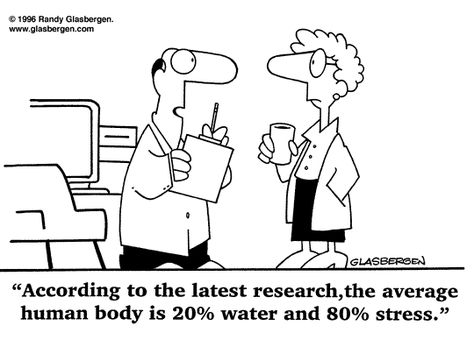One reason why mindfulness is so good for reducing stress, is it helps you notice when stress is building in your body. Giving you time to take some skilful action!
Key insights:
- People with better body awareness tend to feel less stressed
- Mindfulness meditation practices, such as body scans, help you detect early signs of stress, interrupt the stress cycle and regulate yourself
How it works:
- Your body constantly sends you messages about your state (most of which you ignore!)
- Mindfulness practice develops attention to physical sensations
- Regular practice enhances awareness of subtle bodily changes
- Early detection allows for easier stress management
Use body awareness to break the stress cycle
Rapidly beating heart, shallow breathing, sweaty palms, tense muscles. Massive urge to yell, leave the room or punch someone!!! When you encounter stress (both real and imagined) your body has a physiological response.
Your body is always sending you messages about your state via sensations. In mindfulness meditation practices, e.g. the body scan, you train your attention to notice all the subtle physical shifts taking place in the body. Over time, your body awareness grows, and you can track the state of your body, mind and mood throughout your day.
This body awareness is incredibly helpful for noticing those early warning signs that stress is building so you can take care of that stress before it overwhelms you. It’s much easier to nip in the bud and rebalance your system when it’s still mild, then when you are in full fight or flight mode!
Stress feeds more stress
Unfortunately, we tend to spend most of our days lost in thought, running on habit patterns and miss all the subtle signs when we are becoming stressed and need to take care of ourselves.
Often, it’s not one single stressor that causes us to explode. It’s an accumulation of stress building in us over our day (or week or month or year!). If not taken care of, stress feeds more stress.
Tightness and tension in the body impacts on your thinking patterns (negative, catastrophising), your emotions (lower mood, angry, anxious, sad) and your impulses. Subconscious attempts to soothe yourself with unhelpful habits, which may be okay in the short term, but in the long term can cause big issues (hello overeating, over-drinking, over-spending, binge-watching Netflix, [please enter your own personal favourite ‘stress release’ here])! And some fight/flight behaviours can really damage your closest relationships (withdrawing, yelling, or passive-aggressive seething).
Your canary in the coal mine
Much like the canary in the coal mine we all have our own stress reactivity pattern – our ‘tells’ that let us know early on that we are becoming dysregulated. The clearest ones are in our body (perhaps it’s a clenched jaw, tight shoulder, sinking stomach, fluttering chest or pressure in the temple). Mindfulness meditation practices train you to be present in the body. This body awareness allows you to spot tensions building early and respond appropriately. Plus, mindfulness practices have been shown to change the way the brain is wired so you can calm and settle yourself more quickly and be less likely to find something stressful to start with.
This study shows:
– People who noticed bodily changes quickly during challenges felt less overwhelmed
– These individuals could manage their stress more effectively
– Early detection of physical stress signs led to better coping
Mindfulness meditation practices like body scans, have been shown to significantly reduce stress in large-scale studies.
Tips for training up body awareness:
- Do it regularly! Just like training our biceps, regular mindfulness practice is what will improve your attention and body awareness.
- It’s common when starting a practice like body scanning not to feel any sensations in certain parts of the body. Just keep going, over time you will start to feel more connected to your body.
- Be kind and accepting of yourself and what you notice (whether you like it or not!).
- If you want support to start your mindfulness practice, join an evidence-based course like MBSR with a skilled teacher.

